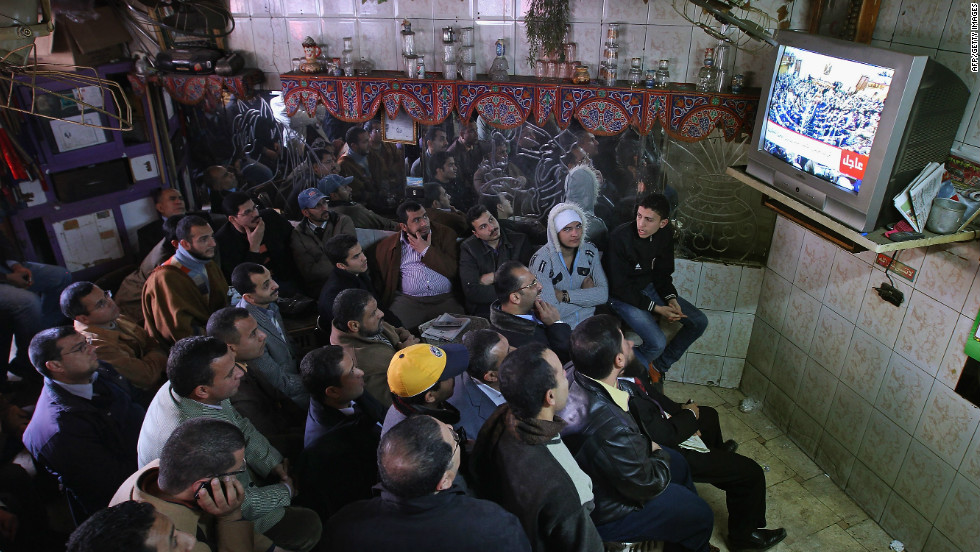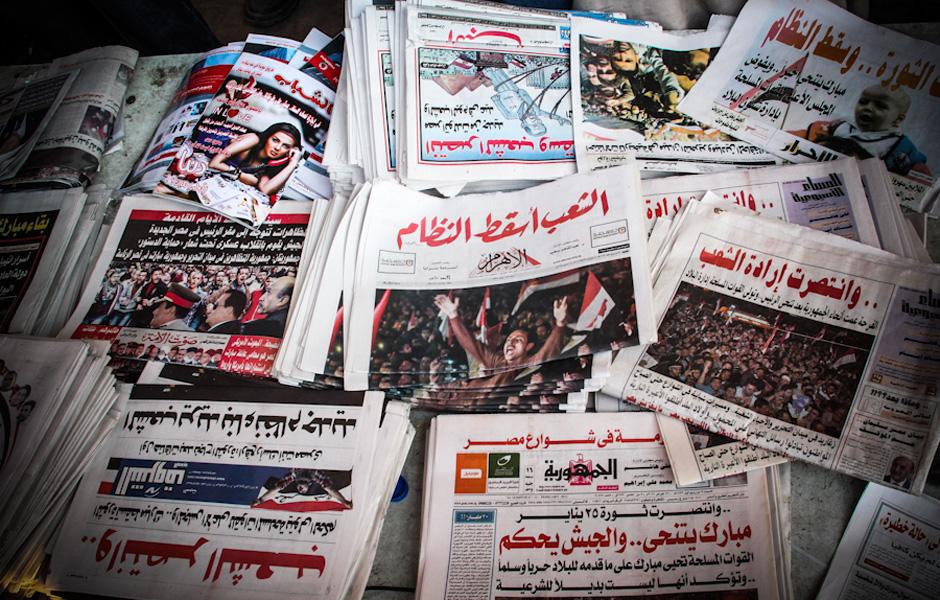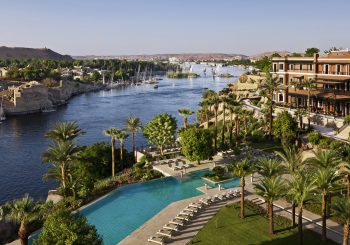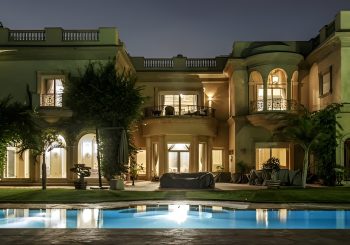Imagine being blindfolded and instructed to walk. You’re on the edge of a hill and you don’t even know it. Would you walk?
Now, what if the person instructing you to walk pushed you? You would free fall off the hill.
You are the victim that has been free falling. Have you hit rock bottom yet?
Who pushed you? It was the Egyptian media.
The bias of the media has slowly engrained its way into every Egyptian household through televisions, Egypt’s most prevalent medium. The television, which is comprised of mostly state-influenced channels, entails a large following. While many television channels are privately owned in Egypt, the Egyptian government indirectly asserts its influence on the gatekeeping of these television channels. In simple terms, the government can indirectly influence the decisions of television channel owners when deciding what information is revealed and what information is concealed.
You can call it self-censorship fueled to preserve economic interests; that is essentially what it is. Simply put, in Egypt, it has now become standard for television channels in Egypt to value economic interests over journalistic values. Valuing economic interests often entails reflecting government interests, or even acting as a mouthpiece for the government.
As a result, most citizens become either passive or supportive of an oppressive regime. Television programming provides reduced visibility of the current regime’s wrongdoing and instead, exaggerates the opposition’s supposed wrongdoing.
A short, five-minute film released in December 2013, that has since resurfaced, brilliantly captures the impact of the media on Egypt. “Trapped” has received around a million views. The film was banned from certain television channels in Egypt and screened on others.
Egyptian filmmakers Hatem Tag and Omar Rashed’s “Trapped” portrays an old man, actor Abdel Rahman Abou Zahra, living a normal life in Cairo, eating and watching television in the comfort of his own home. As the old man flips through the channels, the monotony of the media takes its toll: each channel features breaking news with accusations of “terrorists” destroying the country.
Not only has the media painted and reinforced a false picture in the minds of Egyptians about the current regime, but also has glorified the police and the army. Not only have several Egyptians been fooled time and time again by the media, but they have remained passive at best, silent at worst.
Tag and Rashed’s film literally portrays the trap that has and continues to confine some Egyptians to this very day. The trap is a physical trap. The trap is an emotional trap. The trap is a mental trap. How can the old man’s son, whose framed photos exuberate liveliness through his smile, be a thug? How can he be a terrorist?
The media is Egypt’s very own con artist. It has grown to be adept at lying. It tricks some Egyptians by persuading them to believe things that are simply not true. The media incorporates emotionally charged language as its tool. Its favorite word: any variation of the word “terrorism.”
The people protesting injustice and oppression are “terrorists” according to the media. Journalists reporting on the streets of Egypt were detained for 400 days on charges of having helped the Muslim Brotherhood, a “terrorist” group. What about a mass death sentence confirmed by an Egyptian court for 183 people? The 183 people, “pro-Morsi defendants,” were found guilty of “killing 11 police officers from Kerdasa police station, as well as mutilating their bodies”. Al Ahram also mentioned that the defendants were “guilty of the attempted murder of 10 other police personnel, sabotaging the police station, torching a number of police vehicles and possessing heavy firearms.” Was it a heinous crime? Yes. But, logically speaking, were all the 183 defendants involved in the Kerdasa massacre? Why didn’t the media criticize or even question the mass death sentence?. Instead the media focuses on only one side of the story, the side that often aligns with that of the regime in power.
There is no doubt that political polarization has plagued Egypt and continues to do so. But despite the political polarization that has rifted the Egyptian society apart for the past few years, the media has been aiding in widening that rift. It has become a mouthpiece for the regime, not for the society. Political polarization has become a standard most Egyptian media outlets have become accustomed to report, “pushing state- no less than privately-owned journalism into an abyss of frenzied bias and unprofessionalism” (Shukrallah).
CLICK HERE TO KEEP EGYPTIAN STREETS RUNNING
Such unprofessionalism is littered across most television programs in Egypt, breaching journalistic ethics and integrity. The likes of Amr Adeeb, Ahmed Moussa, Ibrahim Eissa, Tawfik Oukasha and Lamees El Hadeedy, have tainted the image of reputable reporting and journalism. They have come to act as biased political commentators and to be calling them journalists would be a disservice to journalism. The very nature of one-sided reporting, the constant phone calls taken to reinforce or affirm their political commentaries, sometimes avoiding addressing or criticizing political issues or even simply the jargon used to describe political events is by no means professional. So how do these biased commentators succeed in imposing their ideologies on others?
The answer is through simplification, using colloquial language understandable by the majority. Most of these talk shows that discuss political events in Egypt portray a more conversational approach to reporting, which some find more interesting and coherent than the more bland and traditional approach to reporting in which formal Arabic is used.
These biased commentators have adhered relatively well to several important aspects of verbal and nonverbal communication embedded in Egyptian culture. They use hand gestures while speaking, as opposed to sitting rigidly in their seats, making them seem more approachable and warm. They are very emotive, expressive and loud, all of which are important conversational factors in Egypt. And finally, these commentators employ redundancy and reinforcement in their speech constantly and consistently. They repeat phrases and words to emphasize certain points. They take phone calls to reinforce and support their political commentaries. They host guests on their shows that almost always affirm their commentaries, seldom do they ever host critics. Given such reinforcement, some Egyptians have come to believe these commentaries as news, as the truth. These commentators have given into selective hearing, the tendency of ignoring things they do not want to hear, and in turn have exploited their role as gatekeepers.

The role of journalism, to Egyptian society and journalists, “has remained bound within an authoritarian mindset, wherein the dominant perception is one of ‘mobilizing’ or ‘guiding’ public opinion rather than presenting the public with the truth” (Shukrallah). A large portion of Egyptian society continues to believe that free press is simply the presence of opinions rather than truthful, accurate coverage of events. But for the time being, the jargon presented to Egyptians in public opinion talk shows takes priority over any other source of news. For a country in which 94.1% of Egyptians use the television to get news at least once a week, 74.1% are most likely to be interested in watching TV programming on political topics (BBG).
The regime restricts freedom of the press and expression, a fundamental pillar of democracy, and the television media has continually allowed it to do so by preserving its economic interests, or simply out of fear. The retribution for truthful reporting, seen through the previous detainment of the Al Jazeera journalists and current detainment of activists, instigates an atmosphere of fear within the journalism community, leaving journalists with the option of fleeing the country or feeding into pro-regime propaganda.
As a result, extreme self-censorship has become a standard practice for the media, driven by fear and concealed as an act of patriotism in the name of preserving national and business interests. Given the ERTU’s large share in the EMPC and the fear instilled through government crackdowns on the media, it is safe to assume that the media is equally influenced and characterized by both pro-regime propaganda and self-censorship.
Egypt has sparked a war on journalism. Egypt’s democratization has not just stagnated, it has regressed. Democratization has regressed not solely because of the regime intact, but also because of the media that has infiltrated the minds of some Egyptians. It has regressed because of some Egyptians who choose to stay silent out of fear and terror. It has regressed because of some Egyptians who have grown accustomed to trusting these shows as a sole and credible source of information and then disseminating it to others by word of mouth.
Fear is what fuels self-censorship. Government economic and political influence is what fuels propaganda. When combined, when self-censorship succumbs to pro-regime propaganda, these two prove disastrous. It is the media, to use its own words, that “terrorizes” the people; it is the media that “terrorizes” the hope of a democratic society.
Greed and fear has become the motive of the Egyptian media, not journalistic integrity or ethics. Lamees El Hadeedy’s receives a 6 million (EGP) annual salary from CBC, Mahmoud Saad receives a 5 million (EGP) annual salary from El Nahar, Khairy Ramadan receives a 2.4 million (EGP) salary from CBC, among many others. When faced with choosing between remaining blanketed in financial security or adhering to journalistic integrity, these commentators have chosen the former. This is the truth and reality of media in Egypt.
As a result of extreme media bias and the increased prominence of social media, we have now seen a rise in the phenomenon of citizen journalism, journalism conducted by citizens that involves collecting, reporting and disseminating news and information. Citizen journalism has grown to become the Egyptian society’s fighting mechanism against extreme media bias, adding to media diversity by giving underrepresented groups or aspects of society a voice.
Journalistic integrity and ethics is now on life support in Egypt. Journalistic integrity is simply reporting the news without any sort of bias, without any embellishments or downgrading of certain factors within a country. It is pertinent for a democracy to be built upon basic civil liberties such as freedom of speech. It should be sought, not avoided, because it evokes reality. It evokes a reality for which many people have fought for and lost, a reality for which many people have been oppressed and continue to be oppressed fighting for it. Freedom of speech propagates a level of credibility and trust in society that may not be present if there is extreme media bias because it often involves undertones of ignorance and hypocrisy that reverts the paving of democracy.
Mustafa Mahmud, an Egyptian philosopher and author, said: “Freedom incessantly demands its due: it demands responsibility, it demands a burden to be borne; and if it doesn’t receive that, freedom itself will be an unbearable and insufferable burden.”





Comments (23)
let me tell you what I’ve learned, darlin’:
1 there *are* no facts, ONLY opinions
2 only a fool is fooled by the media
having said that, keep on questioning everything. you and your like are your country’s greatest hope, even if it doesn’t know it yet
Leave the politics for the politicians. Don’t give yourself a headache and just enjoy what You have in life. Be thankful because sisi is a major upgrade to what you previously had.